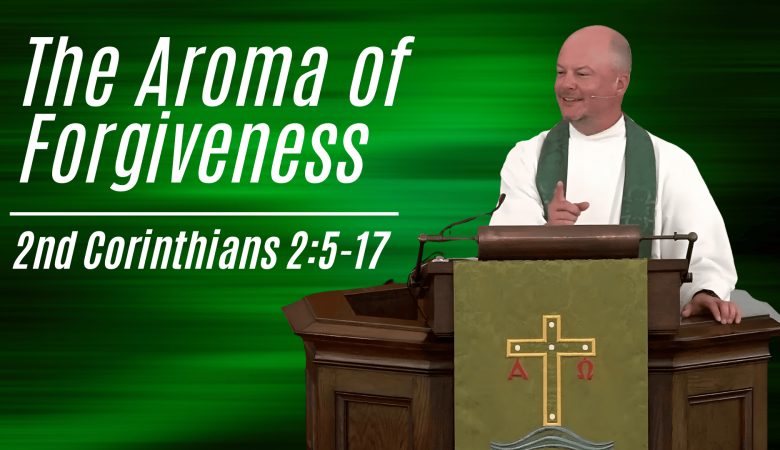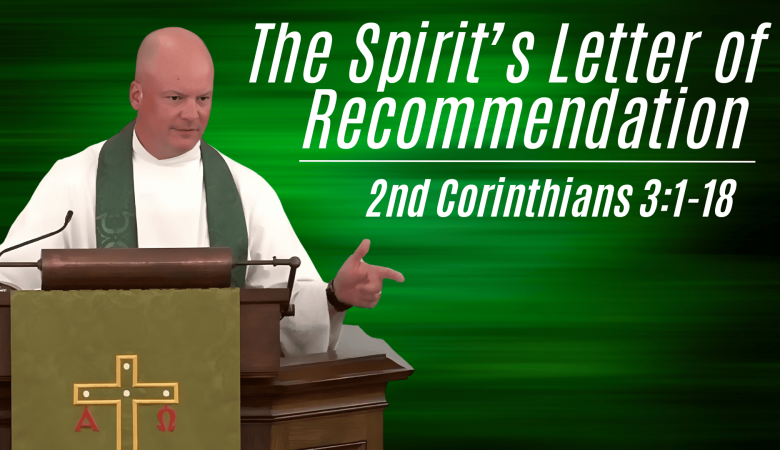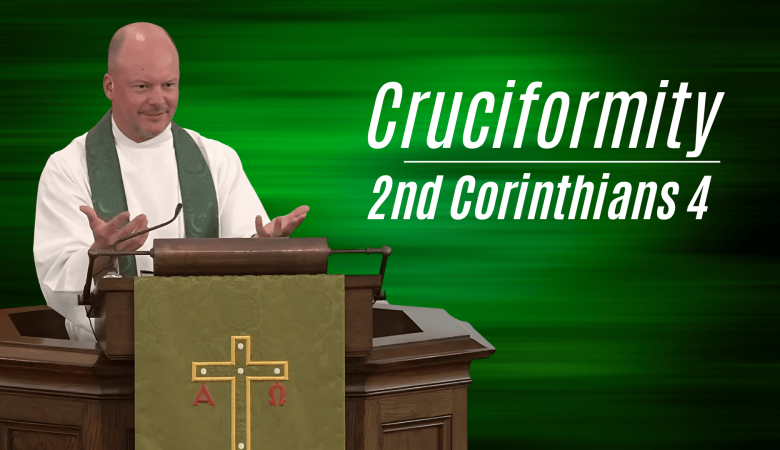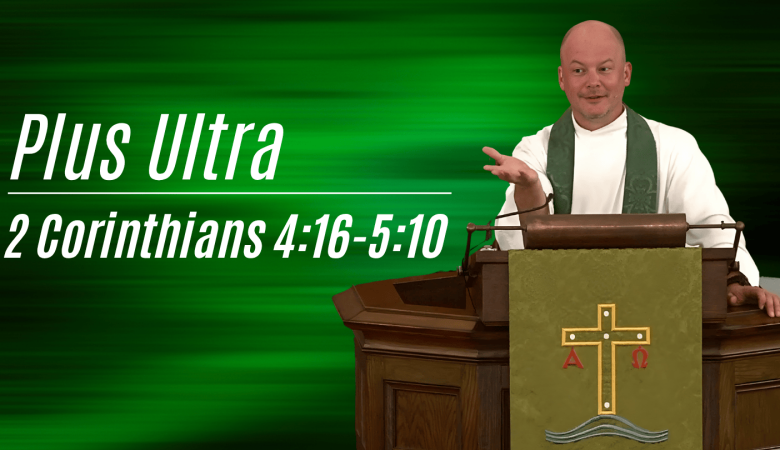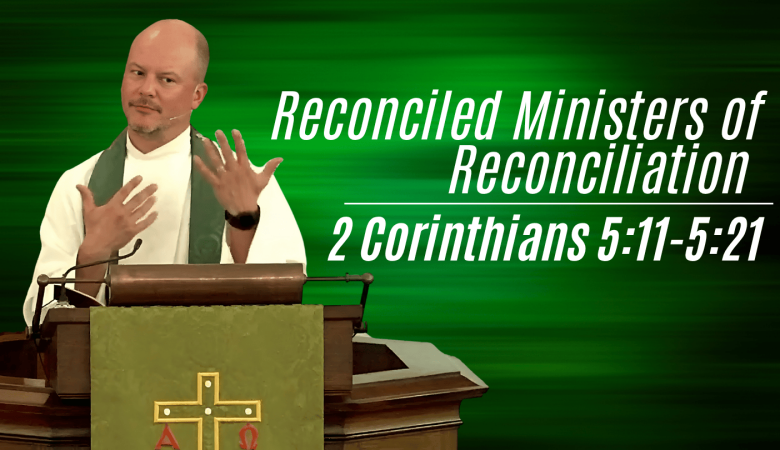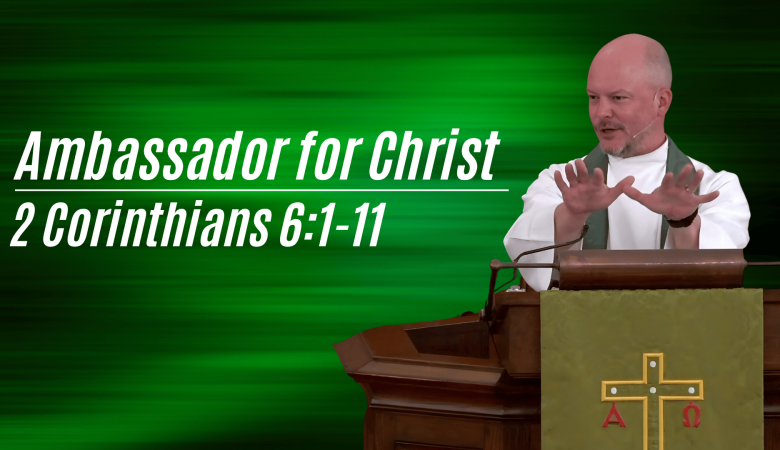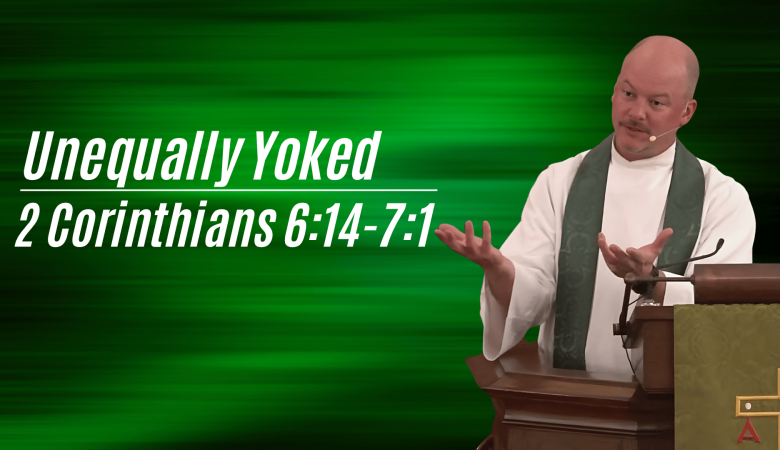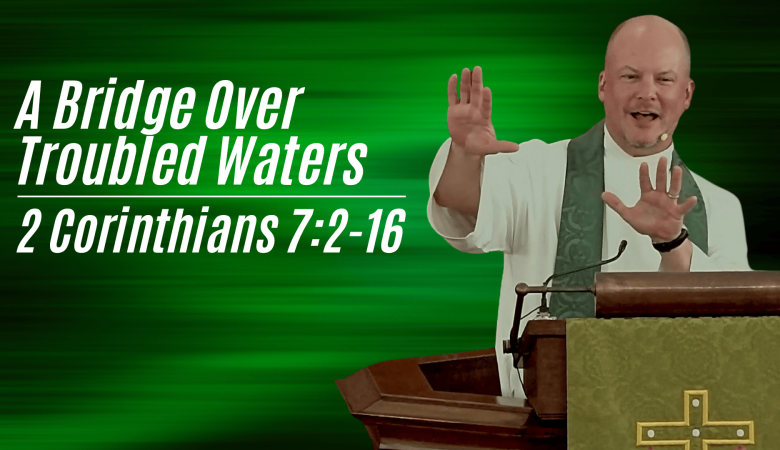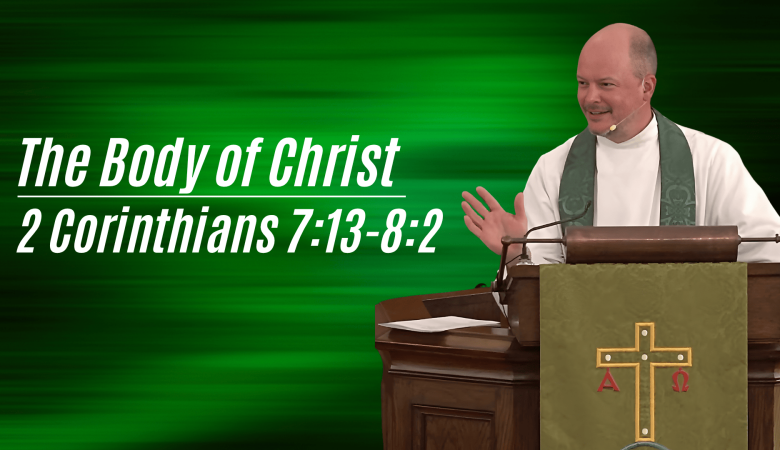Series: Power in Weakness
Comfort in Affliction
August 31, 2025 | Peter Rowan
Passage: 2 Corinthians 1:1-2:4
Summary
Finding comfort in affliction is a central theme in 2 Corinthians, where Paul addresses a church tempted to abandon the difficult path of following Christ. Paul himself experienced three types of affliction: physical suffering that led him to despair of life, attacks on his character and ministry style, and communal conflict within the Corinthian church. These mirror our own struggles with bodily afflictions, personal attacks, and relational strife. The paradoxical truth Paul presents is that God's power is made perfect in weakness, and true comfort comes not by avoiding suffering but by finding Christ in the midst of it. As we share in Christ's sufferings, we also share in His comfort.
Transcript
Lord, as we enter into this new text and sit in it together this fall, Lord, I pray that the distance between us 21st century Christians and those 1st century Christians would diminish. That we might see ourselves often in them as you so often work in us through your Word and that we would be attentive to your spirit. Lord, speaking us, not speaking to your church, not just then, but now, Lord. That you would move in us, God.
That we would. That we would see the beauty of the affliction of Christ and the comfort of his resurrection. That we would see the wonder and also the truth that your power is made perfect in weakness. God. That our devotion to you would only increase, that our love for you would only deepen.
God, speak to us now, please, in Jesus name. Amen.
All right. This morning we are starting a series in second Corinthians and I understand that may seem odd to you. For one, the bulletin says first Corinthians.
That is entirely my fault. It also may seem odd because we are not starting in first Corinthians. Sounds like a natural place to start.
There are a number of reasons for that. I think. For one, my intent is to actually cover the book and I think 1 Corinthians will be much harder to cover in a few months, maybe one day I'll figure that out. Another reason, though, and that first reason or that second reason brings up the third, which is why it's odd. So we're going to try to cover 13 chapters in 13 weeks.
And even as you probably listened to Melissa read that, you thought there is a lot here. So pray for me. There are downsides to this approach, I admit it. Yet I believe there's some benefits to it
One of the things you read as you opened it up is to the church in Corinth, but also to all the churches throughout the region of Achaia. They very likely would have got received this letter. They would have read it to the church in its entirety, likely, and would have spread that letter around eventually copying it, which is why this text and 1 Corinthians actually appear in our New Testament and other texts. We actually have good reason to believe that there was at least one other letter written to the church in Corinth.
Very likely. Possibly two.
Those didn't make it into the canon of Scripture, and so likely they would have copied those. But at first it would have been read and people would have digested it all together. I think there's another good reason for taking it in this approach and that's that I think often, oftentimes you can sort of lose the larger story that's taking place, the larger points that are taking place as we delve into the minutiae, as helpful as diving in can be. So anyway, we are in Second Corinthians and we are in chapter one. Let me begin by telling you a story that I read this week.
Goes like this. A large ocean liner was headed across the Atlantic from Portsmouth, England, think in 1930, 1931 to New York. And as it neared its destination there in New York, a lookout on the wing of the bridge reported light bearing on the starboard bow. Is it steady or moving astern? The captain called back.
The lookout replied, steady, captain. Which meant they were on their way towards a collision course. The captain then called to the signalman, signal that ship. We are on a collision course. Advise you to change course 20 degrees.
Signalman signaled back, advisable for you to change course 20 degrees. The captain said, send. I am a Captain. Change course 20 degrees. Reply from the signalman, I'm a seaman second class.
You'd better change course 20 degrees. By that time, the captain was furious. He spat out, send. This is the mighty ocean liner HMS Franconia. Change course 20 degrees.
Back came the flashing light. This is a lighthouse. Suggest you change course 20 degrees.
So this is not a true story. I read it and I kind of thought this is too. This is crazy. You can't have a lighthouse. And it's not.
I like Google. Is the story about the lighthouse true? No. People think it was first published in about 1931 in the British magazine the Humorist. But it does tell us something very important.
It tells us a life lesson that we know to be true and so does. So do the Scriptures, and that is this. That conflict often reveals character. That the afflictions, the trials that we go through reveal how eager we are to listen, how eager or how willing we are to change course. Our conflicts are revealing.
Our affliction, our trials, our crosses, they reveal us. There's not one person, there's. There's not one person on this earth who does not experience what we might consider to be trials beyond what they could bear.
And, and this is true for you, if you're a Christian or not. Okay. But this is certainly true in the Christian life. Trials that make us consider if, you know, are we on the right track, do we need to hear a warning?
Sometimes they are trials that actually shake kind of the bedrock of our faith. They cause us to shift in a direction away from the Lord. Often trials and Conflicts, afflictions reveal not just our character, but our faith.
So Paul's writing for a number of reasons that we're going to get into. He's writing this church in Corinth to sort of reestablish what was a relationship that had been at odds. So reestablish a positive and a healthy relationship with these churches. He's writing for their comfort. That's one thing we hear quite a bit here.
We're going to get into that. But he also is writing for their commitments, to be convinced of the truth of God in Christ in his cross. He's writing for their reconciliation with him, certainly, but also with one another and with the churches, more broadly speaking, encouraging them to be reconcilers of the estranged. But at the heart of all of this is that they had gone through their own trials, their own afflictions, their own challenges. We'll get into this, but you can think with me a little bit.
Those of you who know, First Corinthians, all the challenges they'd gone through, and they lived in a world like our own, actually, we'll talk about this in the future. But Corinth, in some ways, was very, very modern city and a very affluent city. Okay? And so, like our own, their culture prized success. It prized ease.
And they had initially, of course, been presented with Jesus, the one who dies on a cross through affliction, and yet others who had come in and said, you don't need to go that route. Followers that eschewed weakness, that shunned discomfort, that saw trials and crosses and giving up oneself as an affront to faith, not the bedrock of it, not the center of it. And so, beginning right here in the beginning of 2 Corinthians, beginning of this letter, Paul lays this out for them again, this sort of core idea of Christian faith, that power is made perfect in weakness. And he's going to unpack this in all kinds of ways. But he says this is at the center of it, that comfort comes in our affliction.
That affliction is not something to simply be shunned, but it is actually often the way of the church because it is the way of our Lord, no doubt. I hope, actually you were listening attentively and you noticed how central comfort is in these verses, particularly verses three through seven. But as central as comfort is, affliction seems to be just joined right next to it. And so what I want us to do is actually begin in verse eight, kind of walk our way down and consider some of the afflictions of Paul that are presented Here. And they kind of work their way out, by the way, in the rest of the book in different ways, and at various times.
And then we will speak a little bit to comfort also. So you look down with me at verse eight. We're going to start with the idea that first that Paul is experiencing an affliction in the body. Okay?
Meaning. Meaning actually in himself, in his body. So I'm going to read verse 8 and then just the first half, verse 9. For we do not want you to be unaware, brothers, of the affliction we experienced in Asia. By the way, Corinth is more a part of modern Greece.
Asia would be Turkey, more in the ancient world. For we were so utterly burdened beyond our strength that we despaired of life itself. Indeed, we felt that we'd received the sentence of death. So we could read in Acts, chapter 18 about Paul establishing that great church in Corinth. Paul was actually there for about a year and a half.
And like I said, he wrote other correspondences to the Corinthian church. He wrote sort of in terms of chapters, more chapters to the church in Corinth than any other church. He spent a lot of time there. He went back and visited them, those kinds of things. He had quite the relationship with the church in Corinth.
But after his initial year and a half there, he went on to Ephesus. We could read about that in Acts, chapter 19. And there. There's this initial kind of amazing power that goes out in the name of Jesus as they're establishing the church there, and he's meeting Christians there in Ephesus. And yet it moves on to a riot breaking out, because the message of Jesus challenged that thing that was prized in the city.
Partly their deities, but mostly their commerce. Because, of course, where your heart is and where your pocketbook is, they're where your treasures are. There your heart will be also. There your gods will be. But anyway, we don't know.
One thing that's. That's certainly true about the book of Acts is that Acts doesn't tell us all that happened to Paul. And we read elsewhere of other things that took place that happened to Paul. And here he says that he despaired unto life itself, while in Asia. One of the things that we do know later on in the book of 2 Corinthians, in chapter 11, that we're going to read about is that Paul says he went through many imprisonments, that he went through beatings of that he says were often near death.
He was beaten with rods, he was stoned, he was shipwrecked all the rest. But I thought what was so interesting here is that his affliction in the body, which is most certainly actually, literally ailments and other people's actually hurting his physical body, was also a mental anguish, a mental affliction. Because he says there in verse nine, we felt that we had received. We felt that we'd receive the sentence of death.
And some commentators actually say what we could really be talking about here is that Paul is actually experiencing a mental breakdown, that the afflictions of his body were also the afflictions of his mind, of his spirit, in a way.
Again, one commentator says this. His natural human resources, his natural human resources of energy and strength were worn down to nothing. It's bad to hear a magistrate declare that you are sentenced to death, which Paul experienced. It's far worse when a voice deep inside yourself tells you that you might as well give up and die. What I'm saying is that Paul was not speaking outside of the Corinthian experience.
He's not speaking outside of your experience when he speaks of affliction. He's saying, I know this experience in my body deep down to the point that I felt like I could die. It may be better for me. Paul experienced afflictions in the body that made him despair even of life itself. And think about this.
Here is the great apostle. Apostles were those that laid the foundation of the church. All of them suffered in various ways. But here's the. Here's the apostle who went throughout the known world establishing churches, planting churches, encouraging churches, writing letters.
We have more of his writings than anybody else's in the New Testament. You think of one of the great heroes of Christian faith, Paul, afflictions in his body to the point where he says, I think I might as well die. I'm despairing unto life itself. I'm saying is that for Paul, the call to see comfort in affliction is not divorced from his personal experience, but is actually felt in the deepest part of who he is.
He goes on, though, there's another kind of affliction and he moves towards. So this I'm going to call the affliction in his person, which is not just his body, but in who he is. There's an affliction of what they're saying about him. Look with me down at verse 12. I'm going to read to verse 14.
Okay, I'll have to explain this. I don't. I don't think this will be as clear initially as I read it. For our boast is this the testimony of our conscience, that we behaved in the world with simplicity and godly sincerity, not by earthly wisdom, but by the grace of God, and supremely so toward you. For not we are not writing to you anything other than what you read and understand, and I hope you will fully understand, just as you did partially understand us, that on the day of our Lord Jesus, you will boast of us and we will boast of you.
Now, probably what you noticed here as I read that is the word boasting. It kind of begins and ends that paragraph, little envelope there.
And it again is beginning something that we're going to see later on. But part of what we're going to see is that there were those other teachers who had come to Corinth. They'd come after Paul, and very likely they had come after he had written his first letter. We're going to consider some of the themes of that in a second. And they had given the church more of what their ears tickled to hear, more of what they really just wanted to hear and how they wanted to hear it, the message that eased their minds and their hearts.
We know that in the ancient world like our own, people fancied great rhetoric, eloquence, well spoken, well crafted words. And these guys were actually, Paul will call them later on, super apostles, Superman, the avenger apostles, people that kind of did the flashy and the showy.
And they now it seems as though actually they kind of lived along the lines of the ancient patronage where they would do this and they would receive money for it. They were so good at it that people would pay to listen to them. And Paul, in contrast here, showing his heart for the people of the church. But he says, I came to you with simplicity, and I came to you with a clear conscience, with godly sincerity. But then he says, but not with earthly wisdom, with the grace of God.
He says, I'm not writing to you anything other than what you read or understood. But he says, I wrote to you simply. In some ways, he's saying, I intentionally want you to know that this is for everybody. And so I'm not trying to use lofty words and your ears are being tickled by the fanciful. But it wasn't just that they were sort of interested in eloquence.
They were interested in ease. Man, doesn't this sound like today? Which is to say that the people then said, it's not just how you do it, but that we want us to give you a life where it's not so hard. We want you to give Us commands that are not so difficult. So anyway, part of the beauty of 2 Corinthians is how personal it is.
It's very personal. And we see and we actually feel Paul's heart for the people there at the church. And it is a masterful piece of literature. And of course, we understand that his other writings, he was great with words. And yet Paul says, this is not how I come to you, and you are desirous for this other kind of thing.
And so here's what was happening. Picture this, right? He had established this church he had left. He had written them this other letter. And now there are people that are saying that Paul, he doesn't even know how to talk very well.
He came to you with too much simplicity. You ought to listen to us. And he's saying that you don't care for me. You're not going to boast of me because I'm too simple among you. Meaning that they were attacks on who he was, how he communicated, what kind of person he was.
Part of Paul's affliction was in who he was before them, and they saw it as weakness, as inability, and now likely as something to be discarded. It was not the boast of Corinth. He was actually, in some ways, their embarrassment. You know, part of the affliction that we engage with is others looking down on our ability, pushing us aside, thinking we'd rather have something a little bit more fancy than you. Somebody who has it all together, has a greater education, whatever it is, part of his desire in writing this book is they will come to boast in the weakness of the Gospel and also the weakness of the communicator of the Gospel, that they will see that there's beauty in weakness and in being lowly.
So what I'm suggesting to you, though, here is that there is this affliction that Paul is presenting to them, that it has to do with how he was afflicted in his body and his mind and his spirit. But also part of that affliction was actually from them saying, no, thanks.
All right. A third way in which Paul was afflicted, I'm going to call this that he was afflicted communally, so in his body and personally and communally. So what we know from first Corinthians, which again, is not the text of this morning, is that Paul had planned to come and visit them, in fact, this morning, our text. So he says this kind of thing at the end of first Corinthians, but he also says this here, right, with this dynamic of Macedonia. He's like, I'm going to visit you here and there in this section, second in this next section.
And we know actually that Paul had spent probably three different visits with the Corinthian church. So he visited them a few different times.
But here it says that he didn't visit them to spare them. He didn't come and visit them when he had originally said, and it was for their good that he didn't do this. But they took that as his words being, hey, I'm going to come and see you. No, I'm not going to come and see you. I'm going to come and see you.
As kind of not to be trusted. He wasn't faithful to his words. His yes wasn't yes, his no wasn't no. And in some ways, that's an affliction of his person, like I was just saying, of his character. But there's something else that's going on in this.
This communal conflict that's taking place. Okay, so a lot of you have read First Corinthians. I hope all of you have read First Corinthians.
If you've read First Corinthians, you know that it is a letter full of division. It's the letter that I think a lot of churches read, and they're like, well, they're still Christians. I guess. We're not that bad. It's a pretty rough letter, okay?
It's a letter about divisions. Some of them are divisions about saying, hey, I'm of Paul and I'm of Apollos. And you put, you know, teachers of God's word against each other. It's a letter where you have wild sexual escapades being done in the life of the church. It's just crazy.
There's Christians taking other Christians to court against one another. The Lord's table, which is supposed to be the table of communion, of common fellowship together, is a table where there's great division. Some people are coming before other people get there. Some people are getting drunk at the Lord's table, by the way, not on little thimbles, right? That's not happening before other people are even there.
It's just a. It's a. It's mayhem. Some people, as you read on in First Corinthians, are using the very gifts of the Spirit of God over and against other gifts of the Spirit of God in unloving ways. That's why you find the great chapter on love sandwiched between two chapters on the gifts of the Spirit there in that book.
Like I said, if There is one book in the New Testament that can show just how messy church life can be. It's the book of 1 Corinthians. He doesn't really pull any punches in that book either. He corrects and corrects and corrects. And of course, this was for them.
It was for their growth and their good and their greater commitment to the Lord and them to see the folly of sin and turning away from him and living a life for themselves and against one another to have a time of repentance. But he says, I restrained myself from coming in a way because I actually want you to grow. I want you to sit with this. I want you to understand my words to you, and I don't want my coming to you, just full of tension.
And yet here he is. You know, once again, he's writing to them, and he's saying, my yes is not no, my no is not yes. It's yes and yes, but I'm being led by the Spirit, and it is for your good. But here's one of the really interesting things, right? So he writes them this letter.
This is why I'm saying that there's this affliction within community. He writes them this letter of 1 Corinthians, that's all this correction. And we know from 2 Corinthians 7 that Titus comes and he gives Paul this report, and he has other people ministering, and he understands what's happening in life, that church. And he knows that if he were to come to, there would be this intense affliction, this intense conflict. And so he restrains going to them because he knows that the community there in Corinth and him are at such odds.
Why? Because they don't want to receive his correction from them. I mean, you've probably experienced that some friend comes and tells you, hey, I see this pattern of sin in your life. And you're like, I don't want to talk to you anymore. Please get out of my house.
You know, that kind of thing. And he's like, that's what's going to happen if I go over and knock on your door. You're going to be like, no, Paul, get away. He's like, I'm going to. I'm restraining myself right now for your good and for our good together.
But what's happening is this intense communal conflict, this intense affliction that's taking place.
For Paul, part of the affliction that he's suffering is the affliction of the care for this community. And the wild thing is that they're seeing that, and they're saying, oh, you're duplicitous, you're not to be trusted. It's just the conflict and the affliction is growing and growing. And one of the things that we hear in 1st and 2nd Corinthians is that almost if it's not one kind of affliction, it's another. If it's not, you know, sexual escapades and taking one another to court and fighting over gifts of the spirit and who's superior and all that, well, what we'll see in Second Corinthians is it's hoarding your goods.
It's disdaining the brother Paul, because you're going to say, oh, you're a duplicitous, you're not to be trusted, you're unfaithful. It's not one thing, it's another.
Chapter two, four, the last verse that Melissa read for us tells us that Paul wrote his first letter out of much affliction and anguish of heart, with many tears, not to cause you pain, but to let you know the abundant love that I have for you. That is what he says. But he even says, now, I'm writing this instead of coming to you because there is still a continual conflict, a conflict between us. We communally are still afflicted.
There's a communal affliction which Paul carries in these words here in this letter. And here's partly what I want to say, and brothers and sisters, isn't this our life?
What do I mean?
We all bear afflictions in our bodies and in our minds, in our hearts, a mental distress. We all bear attacks on who we are on our person, lambasting us for one reason or another, our character, our abilities, not just middle school bullying. And we all know communal strife. We know that in the context of our families, but also we know that in the context of church life. These are crosses that you and I must bear, bodies that ail us friends who assail us, not just the foes who assail us.
And part of what's taking place, I think part of what's happening here is it's almost as though Paul is saying, if it's not one thing, it's another.
Job tells us in chapter five, man is born to trouble as surely as the sparks fly upward. And Paul's sort of just listing these out, these afflictions out again and again, and I guarantee you can do the same. And maybe in God's grace, you have not despaired unto death itself. But my bet is that many of you have you have wondered life worth living? Should I continue on?
And in that you also are wondering, as the church in Corinth did, do I press on in the faith? I have been shot at again and again. My body has hurt time and time again. Does God love me?
Is there comfort for the afflicted?
And part of what's happening is that Paul has experienced as we have this trouble that can cause to a despairing life.
He also knows that those experiences cause many others to give up the faith. The life of following Christ faith is being shot at through our physical experience and through our personal experience and our communal experiences. And life here on this side of glory seems to just be full of it. You know, we desire, you know, greener pastures. If only this thing would change.
If only I could get rid of that cancer. Another comes.
If only that person wouldn't say this to me. Then another person starts saying something else, if only I had kids. And then you find out that your sin is shown to you in ways that you never imagined only have I had a different vocation. And then you find that once again there's an affliction in that new one.
I know it is tempting to wish for the next stage of life. Dream of a time when some affliction, all affliction will be gone, but one leads to another. Seems like they just compound.
As one passes, another comes.
I hope you know that I love being the pastor of this church. I really do. But let me tell you without naming any names, as soon as one seeming church trial seems to go to the wayside man, another comes. It's just the way things are.
It is the way of this life affliction, trial, crosses. And I know it's the case for you as well. And Paul knew it was the case for the Corinthian church and their temptation. And I guarantee it is. Your temptation on one hand is to say, I'm just going to despair, and then on the other it's I'm going to listen to somebody that says, no, the good news is not one of affliction.
You are for ease, and eloquence. It's all about the good life.
He says this is a different kind of gospel altogether.
For many of you, the seeming attack on your character and the dynamic at play in your body does cause you to despair of life. But for many of you, it also says maybe, maybe this whole good news of Jesus, it's not true. I need to find my life somewhere else.
But in some ways I want to suggest to you this is where comfort comes in for Paul. Here in these verses, comfort and affliction are intertwined. You know that those, that, that paragraph, verses three to seven there, it's full of comfort, but it's also full of mentioning affliction. Because for Paul and for me and for you, if you are a Christian, affliction and suffering is sharing in the afflictions and sufferings of Christ.
It is part and parcel of the Christian life. God walking with us, us living into the reality of Christ and his suffering for us. And I want you to think about this. Our Lord. Our Lord went from one trial to the next.
Think with me how he began his ministry there in the desert, in the wilderness, being tempted by Satan, no doubt. A trial and affliction. And yet then he goes back to his hometown, to Nazareth. What happens there? Out a communal affliction.
Prophet's not welcome in his hometown. The unwelcome prophet. And of course we could go on and on. But of course, most of all we can think about how he was lied about at his crucifixion, how he was abandoned at his crucifixion, how he was mocked at his crucifixion, how he was spat upon at his crucifixion. How the very community that looked to him as the great leader abandoned him.
Why a desire for ease, thinking that glory can come without a cross. That was their temptation, just like it was the Corinthian temptation, just like it is our temptation.
In Christ's afflictions and his suffering, we are told he brings comfort, and it is the only way he does is not away from the cross, but it is only through the cross that comfort comes. It was in his trials that he was able to help those who are going through trials. It was in his afflictions that he meets us in our affliction. It is in his cross where we know that we can patiently endure our crosses. It is in his resurrection that we know that we will not only share in his sufferings, but brothers and sisters, you will share in his glory.
You will.
We know this on an earthly level. We know. I hope you know this actually, that those who have borne suffering themselves are so much better at walking into, sitting in, sympathizing, in meeting you in your suffering. How much more our Lord Jesus Christ, God himself can meet you in your suffering, care for you attentively in your suffering. And this is the good news of Jesus.
It's not a message that eschews affliction.
Rather, it seems as though it's those who are actually being shot at, those who are being beat down in mind and spirit. It seems as though he's saying, it's actually right there that you know my grace most fully. It's not throwing it aside, but it's the entering into it with my power that my power is made perfect, as Paul says here. For as we share abundantly in Christ's suffering, so through Christ, we share abundantly in comfort, too. That is the way of the Christian, Paul says.
He knows it. He's speaking to the way the church wants to say no to that. And he's saying, this is the way of life because it is the way of the cross and the way of our Lord Jesus.
Let me end by sharing an illustration that I heard from my pastor growing up. Historians tell us that one of the reasons for Napoleon's remarkable military success was the ability and fighting spirit of his marshals, which were his senior commanders. Napoleon knew how much he owed these men. And here's the thing. Napoleon made these marshals fabulously wealthy, unbelievably wealthy.
In return, virtually all of the men were brave. They were on the front lines, and they were actually. They were those who had fought and sort of earned their rank. They were the furthest from sort of the armchair soldiers, right? They were in the battle themselves.
One of them who was much wounded was Francois Joseph Lefebvre. He had come up through the ranks himself. He went a lowly sergeant and eventually got to this rank of marshal and had been rewarded immensely for his devotion and his courage to Napoleon. Anyway, he was once asked to justify Napoleon's generosity to his marshals. And this is what he said.
We will go down into my garden. I shall fire at you 60 times, and if you're still alive at the end, everything I have shall be yours. You think that man took him up on that? Highly unlikely.
But conflict reveals character. Affliction reveals faith. Crosses, the crosses that we bear, in a way, show how committed we are to the cross of Christ.
So if a man like Napoleon knew the value of loyalty, of bravery, of courage, of commitment in the face of trial, brothers and sisters, how much more, Our Lord Jesus.
And if Napoleon knew the afflictions that his soldiers went through out of commitment to him, and he lavished on them all that he did, the Scriptures tell us, our Lord will do so much more. I mean, the truth is, affliction in this life seems to never end. One cross seems to be done, another is before us. And yet our Lord says that while this is the life that we live now, there is a comfort beyond our imagining awaiting for us who hold fast to the cross of Christ.
Let's pray together. Lord, how tempting, how tempted we are, just like the Corinthian church, to find that it is in our trials and it is in our physical ailments, it is in our personal afflictions, it is in our communal distress that we want to throw it all, throw it all away. Because we long in a way, Lord, we long most of all is for the peace of Eden, the wonder of the new heavens and the new earth. And yet, God, so often we want it here and we want it now. And we think that the trials of this life are not pictures of your grace for us, but hindrances of it.
God, I pray that we would hide these words in our heart, that we would not sin against you, that it is in our affliction that we know the sufferings of Christ and we receive the comforts of Christ.
God, teach us these things, Lord, please. God, I pray that we here listening now, but maybe spend time this afternoon contemplating how our trials have moved us away from you. And yet, God, I pray that even in those contemplations that you would move us toward yourself, that we would see that your power is made perfect in our weakness, that afflictions of this life only serve bring your comfort and a greater desire for the life to come. For there will be no more crying or tears or pain anymore. They will be the former things.
And you will reign as the Lamb who was slain, who received affliction here in this life on our behalf, that we might know the comfort of the resurrection. Pray this in Jesus name, Amen.
Series Information

Second Corinthians is Paul’s defense of his love for and love toward the church in Corinth. Paul’s defends his apostolic ministry against critics who question his authority. He recounts profound suffering—beatings, imprisonment, near-death experiences—yet refuses to boast except in his weaknesses. Through personal vulnerability, Paul reveals Christ's power working most effectively in human frailty. He describes his mysterious "thorn in the flesh," where God's response becomes the letter's centerpiece: "My grace is sufficient for you, for my power is made perfect in weakness." Paul embraces this paradox, demonstrating that divine strength flows through broken vessels. His authenticity and struggles validate rather than undermine his ministry, proving that God's power shines brightest through human limitation and dependence.

